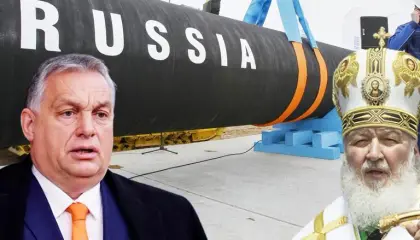EU leaders on Monday thrashed out an agreement to halt the majority of Russian oil deliveries by exempting supplies that arrive via pipeline, after weeks of stubborn resistance by Budapest.
JOIN US ON TELEGRAM
Follow our coverage of the war on the @Kyivpost_official.
Ambassadors from the 27-nation bloc met Wednesday to hammer out the legal details of the move and the rest of the package of sanctions, the sixth wave to target Moscow over the war in Ukraine.
European diplomats said Hungary was refusing to give the green light as it rejected putting the head of the Russian Orthodox Church Patriarch Kirill on the assets freeze and visa ban blacklist.
Kirill, 75, is a fervent support of Russian President Vladimir Putin and has backed his military campaign in Ukraine. Most EU governments support adding his name to the sanctions list.
Ambassadors were set to hold a fresh round of talks later Wednesday to try to hammer out the differences, diplomats said.
EU officials say the sanctions being drawn up will see some 90 percent of Russian oil exports to the EU halted by the end of the year as the bloc tries to halt funds flowing to Moscow’s coffers.
Hungary’s leader Viktor Orban, which is reliant on Russian oil, won a carve-out for pipeline deliveries after arguing a ban would devastate his country’s economy.
The text under consideration also includes disconnecting Russia’s largest bank Sberbank from the global SWIFT payment system and a ban on insurance for shipping Russian oil to third countries.
The other proposed additions to the blacklist also include Putin’s alleged girlfriend, former gymnast Alina Kabaeva, and military personnel suspected of war crimes in the Ukrainian.
The weeks-long hold-up over the sixth package of sanctions has rocked EU unity over the Kremlin’s war in Ukraine after the bloc slapped five waves of unprecedented economic punishment on Moscow.
